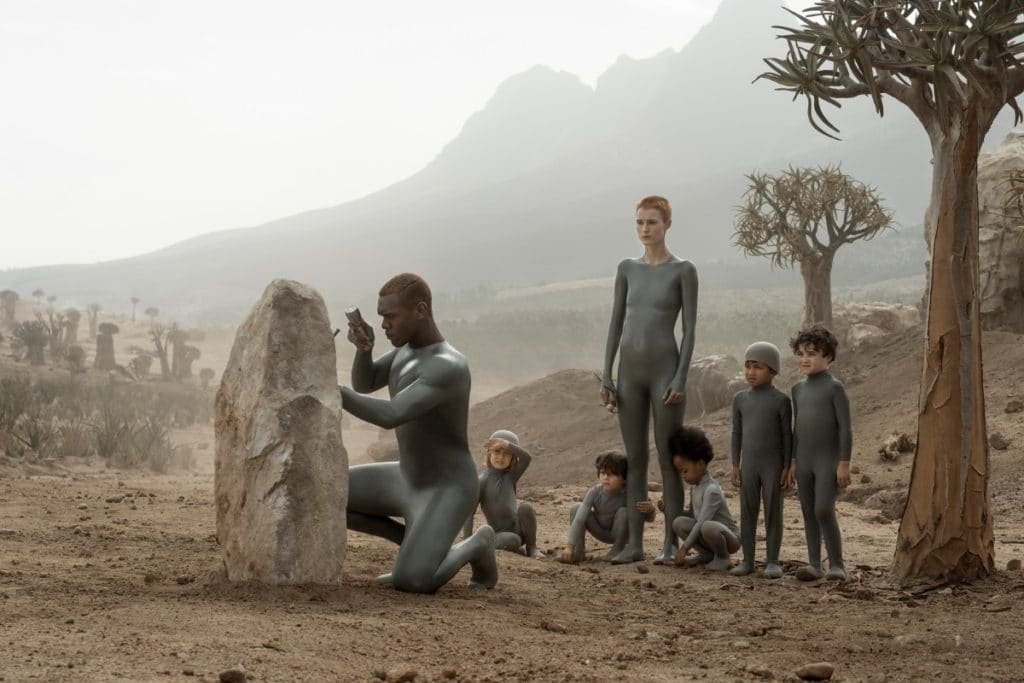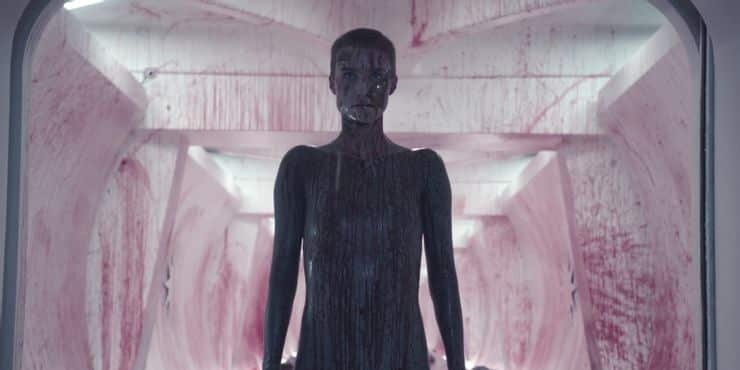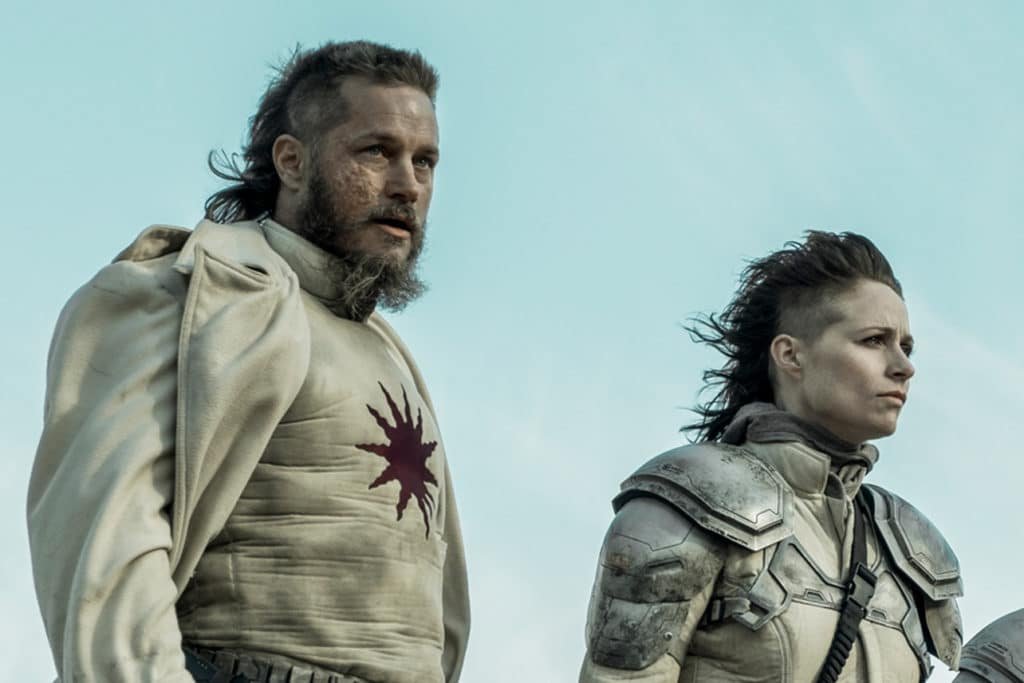
The TV series Raised By Wolves follows a battle being fought in microcosm, but the resources which are being fought over surpass the usual struggle for land, wealth and power. Having been forced to abandon Earth – now on the verge of destruction, if not already past that point – a small contingent of militant theists, the Mithraic, have created a vessel called an Ark, which they hope to take into deep space in order to settle another planet. However, their adversaries on Earth, the hardline atheists, are fighting back: a tiny lander, equipped with two androids – ‘Mother’ and ‘Father’ – and a number of viable human embryos, has beaten them to a barely-hospitable alien world, Kepler-22b. The territory itself might be contested here, but the real fight is for the future of human life; in such times as these, any notion of a traditional, nuclear family has necessarily been abandoned.
Viable life, and importantly, life which follows the appropriate ideology, takes precedence, and as these two things are hard to come by, it takes precedence by any means. In many respects Raised By Wolves keeps its focus on parenting and the survival of the young, whilst also shining an often unpleasant light on the whole childbearing and child-rearing process, here seen as fraught, duplicitous, flawed – and even circumvented altogether. It’s a pretty bold move, but one which you’d absolutely expect from a producer like Ridley Scott, who has a long history of disrupting the mother/child relationship…
The first scenes of the show give us Mother (Amanda Collin) and Father (Abubakar Salim) busying themselves with what they have been tasked with doing: firstly they need to incubate a number of the embryos, whilst also establishing a rudimentary colony (and despite the hi-tech means which brought them to the planet, there are no ultra mod cons beyond the lander. They elect to eke out an existence which looks little beyond Neolithic.) Of course, Mother and Father themselves are not human – this is made abundantly clear given the way in which Mother incubates the embryos – but Father, at least, has been programmed to be an affable companion and not much more: he bears the children’s antics with patience, he tells jokes, and he acts as a helpmeet to Mother, who dominates proceedings. However, it is Mother who eventually breaks out of her careful programming as a nurturer (and we see evidence of how long this process took, in flashback, later in the show). The arrival of the Ark into the planet’s orbit – and the presence of a theistic landing party, which stumbles upon the settlement – triggers a glitch in Mother’s programming: she is in fact, and in one of the show’s moments of bleak irony – actually a Necromancer, a type of android designed to destroy life and one designed for use by the Mithraic against the atheists. Necromancers have the power of flight, and can use the pitch of their voices (actually a banshee-like scream) to maim and kill; faced with the old enemy, Mother shows herself to be vengeful and unpredictable. You have to wonder at why, exactly, her creator/reprogrammer felt that this model of android was the best model to mould into a cooing maternal figure, but maybe he liked a challenge.

It’s not a perfect revamp, in any case, and Mother takes it upon herself to destroy the Ark in its entirety; although she was reprogrammed not to blindly persecute the ‘wrong’ humans, old habits die hard. But, to restock her own depleted brood, she first kidnaps the Ark’s ‘children’, which seems to mean anyone under the age of eighteen. The majority of her own batch of children have already died as a result of a series of rookie errors: it hadn’t occurred to either Mother of Father to properly test the only food source they’d been able to find and cultivate, meaning a creeping dose of radioactivity (as well as the issue of huge, nearby craters) has done for all but one of them, Campion. In effect, an android purposefully rehabilitated into a matriarch has allowed her family to eat poison or fall to their deaths; when faced with other humans, she has murdered hundreds of them on principle, forgetting her new programming temporarily and terrifying her sole remaining ‘son’, as well as kidnapping a number of young Mithraic, with the aim of deprogramming them. It doesn’t seem to occur to either her or Father to plunder the remains of the Ark for any resources which would help them; Mother’s sole interest in the Ark relates to herself, as she chooses to interact with a simulator – in order to access her own, carefully-stored and hidden memory files. It’s telling that Mother, for all her maternal strengths, is so flawed: she gives her name as ‘Lamia’, a mythical monster believed to prey on human beings and drink the blood of children. Is this a moment of self-awareness, even humour on her part? Or is she aware that she is still a risk to the children, as well as everyone else? What we see here is a being redesigned to nurture, but deviating from her path in a series of ways, either by incompetence or design. This adoptive mother is usually well-intentioned, but challenged. She feels compelled to do the right thing, but often struggles.

There is another adoptive mother in the show, this time human: the aptly-named Mary (Niamh Algar), who alongside husband Caleb (Travis Bickle). These two atheists killed a man and a woman whilst fleeing the Mithraic on Earth; they then realised that these two were Mithraic officials, with a place on the Ark reserved for them. Using the means at their disposal, they decide to alter their facial features to look like the two deceased, and manage to trick their way onto the vessel. But the people they have replaced, Marcus and Sue, have a young son, Paul: at this stage, he is none the wiser that his real parents have been murdered by the people tasked with looking after him. Both the adults feel a pang of responsibility for Paul, now orphaned by their hands, but it soon becomes more than that, with a sense of affection springing up – one which we are led to believe was wholly lacking from Paul’s life with his real parents. Elements of this story arc are genuinely quite touching; Paul and his ‘father’ discover how to play, and the boy gets showered with affection. But the straightened circumstances on Kepler, not to mention the hints at something seemingly supernatural at play, begins to sway Marcus, making it increasingly difficult for him to inhabit his old identity. He begins to believe that ‘Sol’, a version of the monotheistic God we’re probably all familiar with, is really speaking to him; rumours of a prophecy, which he at first thought might alight on Paul, he now begins to claim for himself. This has a dark influence on his behaviour, towards both his wife and his son, and it also leads to him becoming indiscriminately violent, killing several of the handful of Mithraic who have survived – in times when the survival of the human race is paramount, this looks as deranged as it is.
The show’s only human nuclear family unit, then, flawed as it is, quickly comes apart at the seams, with Sue/Mary fleeing her now-unpredictable husband, leaving him to his now dissatisfied, suspicious body of soldiers. As for Paul, Sol allegedly tells him the truth, leading him to attack Mary; he sees her now only as a killer, and this obliterates what has gone before. This is particularly sad, as Mother – who correctly ascertains that Mary is not Paul’s biological mother, and seems even to taunt her momentarily for it – had only just, grudgingly, told Mary that she was nonetheless a ‘good mother’. Mary had also revealed that she is infertile; the injury Paul causes to her abdomen is perhaps symbolic.

In Season One, we only see one human, biological pregnancy taking place – and, in another of the show’s uniquely dark twists of the knife, it is the result of a rape. The girl in question, Tempest (Jordan Loughran) was assaulted whilst in stasis, and so unable to fight back; she is also part of the group of stolen Ark children, so it’s assumed that she is below the age of consent as we’d understand it, but perhaps in the 22nd Century this differs. Needs must. Regardless, Tempest is very young, and extremely traumatised; Mother’s immediate, borderline obsessive interest in her pregnancy upsets her greatly, and the girl is so desperate to abort her foetus that she attempts suicide. Mother, as representative of her programming, wants to support Tempest through this pregnancy by any means and her well-meaning attempts to get the girl to put her experience behind her comes across as extremely, if unwittingly crass. Mother fails to understand, in the ways that lots of humans fail to understand. The rapist in question, a ranking Mithraic, is also still alive, having survived the Ark’s crash; he is being punished for his actions, but he still finds a way to get around this, threatening Tempest and attempting to escape. His defence, that Sol wanted him ‘to be fruitful’, is a particularly sinister touch, given that this uses religious tenets to override consent. At least the Mithraic were having none of it, though this is small comfort to Tempest, and although she gets her moment, it doesn’t rid her of the pregnancy.
There is of course one more pregnancy in Season One, and thankfully it isn’t the standard sci-fi ‘whaddya know? You CAN have a baby!’ curveball which it seemed to be at first – a plot device as old and weary as time. Mother herself – as a result of interfacing with her memory files – undergoes an experience where she seems to become pregnant; apparently, this capacity was always in-built, and she comes to understand via the interface that her human brood was only ever intended as a kind of practice run. This, though? This is the real deal. This plot development had the capacity to be a tad disappointing; one of the series’ most interesting aspects is in watching Mother navigate her maternal feelings as a ‘creation’ and not a ‘creator’, so to suddenly turn her into the thing she thinks is impossible could have been a rather obvious move. But it’s not so: Mother’s pregnancy is horrific; whatever is in there needs plasma for food, so for instance Mother has to ransack the Ark for sources of this – it’s hardly a picture-book pregnancy, and there are some graphic sequences as Mother tried to balance the foetus’s needs against her own rising sense of concern. However, the survivors of the settlement attempt to help her as her pregnancy develops; there’s a sense of wonder hanging over it, perhaps a belief that this is, in any measurable sense, a miracle.

The ways in which the show’s writers quite abruptly scupper this is a great tour de force. With some ideas clearly in keeping with the Alien franchise – perhaps particularly Alien 3 and Alien: Resurrection – Mother’s baby is no baby at all, android or human. It is instead likely to be a being which no one on the planet has yet seen, except as fossilised remains; one of the great snake creatures, presumed extinct (but never make that assumption on Kepler – there seem to be a few species lurking in the shadows). Or is it? The show gives little away. Here, a wealth of prophecy seems to have come to the fore, and there are hints that Mother, Father and the others are predestined in this; Mother’s horror at what she has created leads to her taking the initiative, attempting to kill herself and the creature. Is it successful? The show closes with a certain level of ambiguity over that, but what is certain is that Mother seems to be about to die replaying memories of Campion, not her ‘birth child’; her human brood did not seem to be some less-worthy experiment in the end, if it is the end at all…
Raised By Wolves, right down to its symbolic title, is about world-building, but key to that process is nurturing and raising children. To do this, traditional models of parenting may be present in some aspects, but they are also overthrown, at least to an extent, for a range of reasons: fate, necessity, emotion, guilt, lack, loss and in Mother’s case, as a means of exploring her sense of ‘selfhood’, her programming, and what it all means. The answers to these questions have not yet been given, and doubtless this will be explored in Season Two, but just as old ideas of marriage and family life are becoming obsolete, traditional ideas about caregiving and nurture will remain crucial.
Raised By Wolves – Season Two – will premiere on 2nd February 2022.
